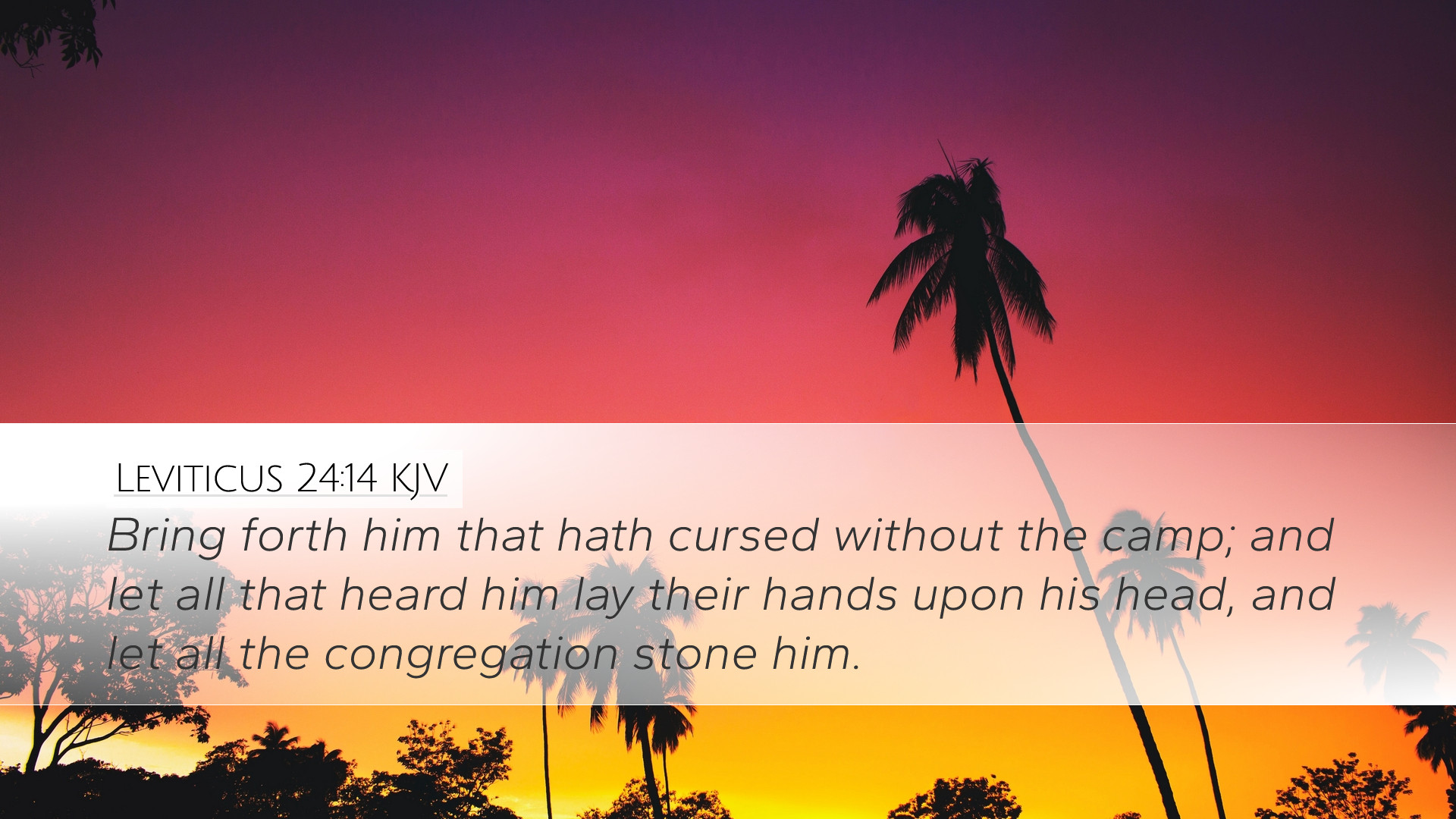Commentary on Leviticus 24:14
Leviticus 24:14 states: "Bring forth him that hath cursed without the camp; and let all that heard him lay their hands upon his head, and let all the congregation stone him." This verse delineates procedures concerning blasphemy and its punishment, which are crucial in understanding the holiness of God and the seriousness of sin within the community of Israel.
Overview of the Context
The book of Leviticus is part of the Pentateuch, traditionally attributed to Moses, and outlines the laws and rituals that define Israel's relationship with God. Here, we find laws concerning worship, moral conduct, and social justice. Leviticus 24 discusses the care of the lamps and the showbread, culminating in the troubling case of blasphemy and its grave consequences.
The Sin of Blasphemy
In this particular verse, the act of cursing the name of the Lord is treated with utmost severity. The significance of God’s name in Hebrew culture cannot be overstated; it represents His character, authority, and the covenant relationship between Him and His people. To curse God is not merely a verbal offense; it represents a profound rebellion against divine authority and holiness.
Commentaries on Blasphemy
-
Matthew Henry elucidates that the blasphemer not only disrespects God but seeks to undermine the faith of the community. He points out that the gravity of such acts warrants communal judgment, illustrating the idea that the entire community shares responsibility for maintaining the holiness of God’s name.
-
Albert Barnes emphasizes that the command to stone the blasphemer serves as a deterrent for others. Blasphemy disrupts the covenant relationship and poses a risk to collective worship and reverence for God. By laying hands on the blasphemer, witnesses affirm their testimony, thereby reinforcing the community’s accountability.
-
Adam Clarke highlights the seriousness with which God treats His name. He contextualizes the punishment within the broader patterns of holiness and justice reflected in the Law. Clarke argues that the severity of the punishment underscores the need for reverence toward God and the communal purity that is essential for Israel's identity.
Community Responsibility and Justice
The participation of the congregation in the act of judgment is notable. Matthew Henry comments on the communal involvement in executing God's justice, which signifies that sin affects not only the individual but the entire community. This act of laying hands on the accused signifies the transfer of responsibility and serves to unify the community in its commitment to uphold God’s holiness.
Consequences of Sin
The harshness of the punishment reflects the seriousness of corrupting influences in the community. It also serves as a reminder of the broader theological implications of sin. According to Albert Barnes, this punishment aims to discourage future acts of blasphemy and maintains the sanctity of Israel's worship practices. God’s holiness demands a response that reflects the seriousness of sin’s consequences.
Theological Reflections
The themes presented in Leviticus 24:14 have enduring relevance for contemporary theology. The text invites readers to reflect on the nature of God’s holiness and the appropriate human response. Blasphemy serves as a crucial indicator of how one's speech and action can either honor or dishonor God's name.
Pastoral Applications
-
Pastors are reminded of their responsibility to teach about the sacredness of God's name and the importance of reverent speech in worship and daily life.
-
This passage can serve as a cautionary tale against flippant attitudes toward faith and the divine, prompting communities to cultivate a culture of them are devoted to reverence and holiness.
Conclusion
In conclusion, Leviticus 24:14 encapsulates vital truths about the nature of sin, communal responsibility, and the holiness of God. The insights derived from the commentaries of Matthew Henry, Albert Barnes, and Adam Clarke enrich our understanding of this text and emphasize the profound implications for both ancient Israel and contemporary believers. By maintaining a focus on God’s holiness, communities can foster an environment that honors God’s name through purity and justice.


